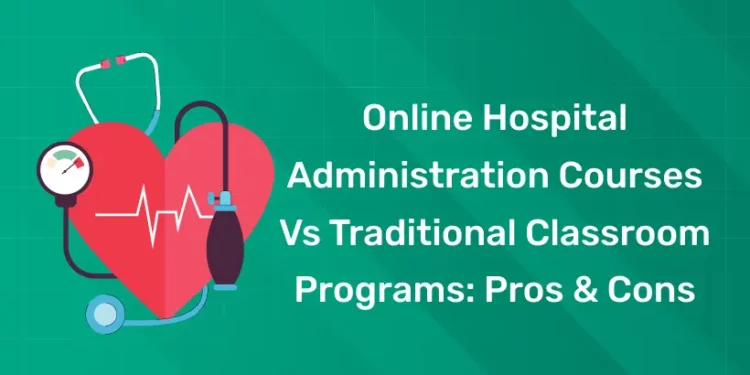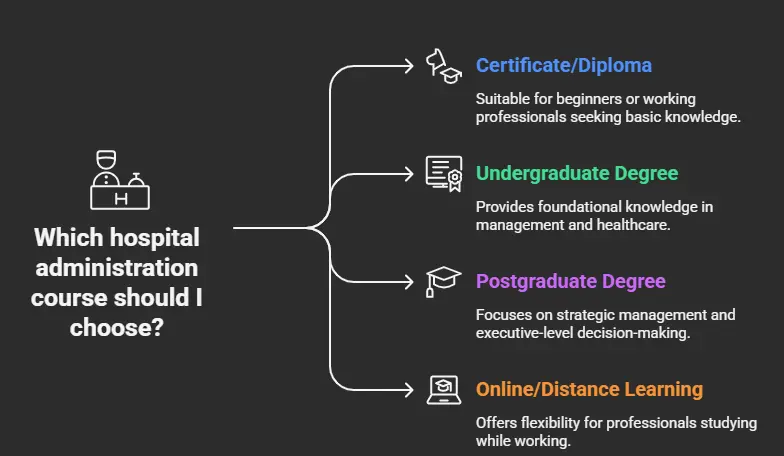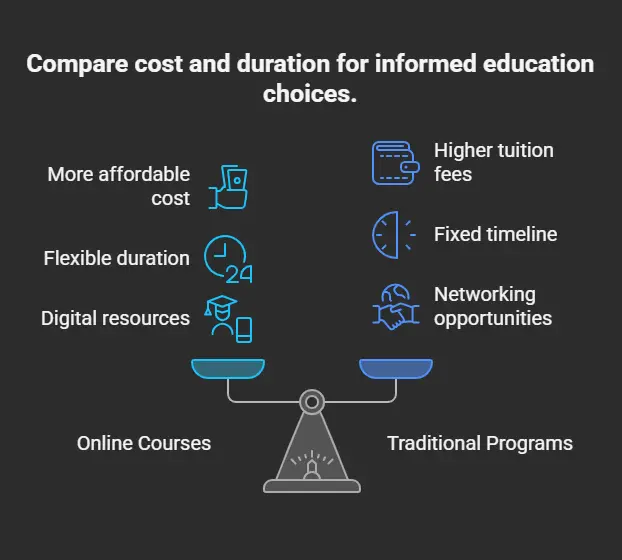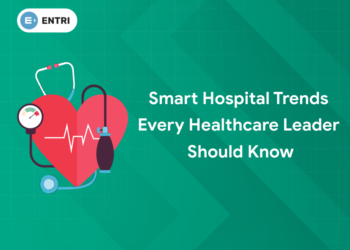Table of Contents
Choosing between online hospital administration courses and traditional classroom programs can feel overwhelming. Both offer valuable knowledge and career opportunities, but the learning style, flexibility, and overall experience are quite different. Online courses provide convenience and accessibility, while classroom programs bring face-to-face interaction and structured learning. Understanding the pros and cons of each option will help you pick the path that best fits your goals, lifestyle, and future in healthcare management.
Explore Your Future in Hospital Administration! Enroll now
Introduction
Demand for skilled hospital administrators increases as the health care system becomes more complicated. For the preparation of this career, students can choose between online hospital administration courses and traditional classrooms. Both learning paths are designed to create knowledge in health care, leadership and organizational skills – but the way they provide education is very different.
Online programs provide flexibility and convenience, giving them a great alternative for working professionals or busy programs. On the other hand, traditional classes provide face to face interactions, structured teaching and networking opportunities. By detecting pros and cons from both approaches, you can decide which alternative corresponds to the learning style, career goals and personal situations.
Overview of Hospital Administration Courses
1: What is the primary role of a hospital administrator?
Hospital administration courses are designed to prepare students and professionals for leadership roles in health services. These courses focus on producing knowledge in management, health care, finance, operations and policy designs, which help students develop the skills required to effectively run hospitals and health services.
The main goal of these courses is to train individuals to handle both business and hospital administration health services. Students learn how to manage the budget, coordinate employees, improve patient services, ensure compliance with health services and make decisions that increase the general efficiency and quality of care.
Types of Hospital Administration Courses
- Certificate and Diploma Programs – Short-term programs that present the basics of the healthcare system are suitable for beginners or working professionals.
- Undergraduate degrees (BHA, BBA, in the health care system or public health management) – Which provide basic knowledge in management, health care and management.
- Postgraduate Degrees (MHA, MBA in Healthcare, MPH) – Advanced programs that focus on strategic management, policy design and decision-making at the executive level.
- Online and Distance Learning Programs – It is the flexible options for professionals who want to study while working.
Key Subjects Covered
- Healthcare systems and policies
- Hospital operations and administration
- Human resource management in healthcare
- Healthcare finance and budgeting
- Patient care services and ethics
- Healthcare laws and compliance
- Technology in hospital management
Who Can Enroll?
Hospital administration courses are open to students with different educational backgrounds, especially people with degrees in medical, nursing, life science, business or public health. Professionals working in the healthcare system can also sign up to pursue their careers.
Career Path After the Course
Graduates can work as hospital administrators, health professionals, department heads or advisors. These roles are available in hospitals, clinics, nursing homes, insurance companies, pharmaceuticals and public health organizations.
Hospital Administration Course with Assured Career Growth
Hospital Administration Course by Entri App: Master essential healthcare management skills, gain certification, and secure top roles in leading hospitals
Join Now!Online Hospital Administration Courses
Online hospital administration courses are designed for students and professionals who want to build leadership skills in the health care system without the need to participate in physical classes. These programs provide similar knowledge and training in the form of traditional courses, but at any time provide flexibility to study anywhere. This makes them particularly useful for working professionals, busy students or such individuals who cannot transfer to full-time classrooms.
What Do These Courses Cover?
The topics covered in online hospital administration courses typically include:
-
Healthcare systems and policies.
-
Financial and budget management in hospitals.
-
Human resource management and staff coordination.
-
Patient care quality and safety standards.
-
Healthcare laws, ethics, and compliance.
-
Technology in healthcare, such as electronic health records (EHRs) and telemedicine.
-
Strategic planning and leadership in hospitals.
These subjects equip students with a comprehensive understanding of both the business side and patient care aspects of healthcare. In addition, many courses now include modules on data analytics in healthcare, risk management, and crisis management, helping learners to make informed decisions in complex situations. For instance, students may analyze case studies on hospital resource allocation or study healthcare policies affecting patient safety, preparing them to tackle real-world challenges effectively.
Benefits of Online Courses
-
Flexibility: Students can study at their own pace, making it easier to balance education with work or family responsibilities.
-
Accessibility: Learners can enroll in programs offered by international universities without the need to relocate abroad, providing exposure to global best practices.
-
Cost-Effective: Online programs are often less expensive than traditional classroom courses, reducing tuition, travel, and accommodation costs.
-
Technology Integration: Students gain experience using online tools, digital management systems, and virtual collaboration platforms, which are increasingly important in modern healthcare.
-
Skill Development: Online courses enhance soft skills like leadership, communication, and problem-solving while also teaching technical skills in hospital management and healthcare technology.
-
Networking Opportunities: Many programs offer virtual networking with instructors, industry professionals, and peers, opening doors to mentorship and career opportunities worldwide.
Who Should Take Online Hospital Administration Courses?
These courses are ideal for:
-
Working healthcare professionals aiming for leadership roles.
-
Graduates seeking to start a career in hospital management.
-
Students or professionals in management who are interested in the healthcare sector.
-
Professionals in nursing, pharmacy, or public health seeking to expand career opportunities.
Online learning allows these individuals to gain knowledge and qualifications without disrupting their current work or personal commitments.
Career Opportunities After Completion
Completing an online hospital administration course can lead to various career paths, such as:
-
Hospital Administrator
-
Healthcare Operations Manager
-
Medical and Health Services Manager
-
Healthcare Quality Officer
-
Public Health Manager
Graduates can find opportunities in hospitals, clinics, nursing homes, insurance companies, pharmaceutical organizations, healthcare startups, and even government health departments. With the growing demand for skilled healthcare administrators, online courses provide a fast and flexible pathway to enter management positions and contribute to improving the efficiency and quality of healthcare delivery. Additionally, professionals with online certifications often have the advantage of being able to work internationally, applying global best practices in hospital administration.
Explore Your Future in Hospital Administration! Enroll now
Traditional Classroom Programs in Hospital Administration
There are more traditional and structured ways to learn traditional classroom programs in hospital administration. These programs take place in universities, colleges or special health institutions, where students participate in classes, interact with professors and participate in group activities. They are designed not only to provide educational knowledge, but also practical risk and networking opportunities.
What Do These Programs Cover?
Classroom-based hospital administration programs usually include:
-
Fundamentals of healthcare systems and hospital management.
-
Financial management and budgeting in healthcare.
-
Human resource management and staff supervision.
-
Hospital operations, logistics, and patient care management.
-
Healthcare law, ethics, and compliance.
-
Leadership and organizational behavior.
-
Practical training through internships, case studies, and simulation exercises.
These subjects give students a strong foundation to handle both strategic planning and day-to-day operations in hospitals and other healthcare facilities. Many programs also include specialized modules such as hospital marketing, patient satisfaction management, and healthcare technology systems like electronic health records (EHRs). Exposure to real hospital environments during internships allows students to understand workflow management, emergency preparedness, and interdisciplinary coordination, preparing them for immediate roles in healthcare administration after graduation.
Benefits of Traditional Programs:
-
Face-to-Face Interaction: Direct communication with peers and health professionals fosters strong relationships, mentorship, and a better understanding of hospital operations.
-
Structured Learning: Fixed schedules, classroom environments, and regular assessments ensure disciplined and focused study habits.
-
Networking Opportunities: Students gain access to professors, healthcare leaders, and classmates who can provide career guidance, recommendations, and professional connections.
-
Hands-On Experience: Internships, hospital visits, and workshops offer practical exposure to hospital operations, patient care logistics, and administrative challenges.
-
Comprehensive Skill Development: Students develop both hard skills (budgeting, compliance, and staff management) and soft skills (leadership, teamwork, communication) essential for healthcare administration.
Who Should Choose Traditional Programs?
Traditional classroom programs are ideal for:
-
Students who prefer structured, in-person learning.
-
Individuals seeking strong networking opportunities with healthcare professionals.
-
Learners who benefit from classroom discussions, collaborative projects, and group problem-solving.
-
Those looking for hands-on experience through hospital placements and internships.
These programs are especially useful for those planning to start their careers in healthcare administration immediately after graduation, as they combine academic rigor with practical exposure.
Career Opportunities After Completion
Graduates of classroom-based hospital administration programs can pursue roles such as:
-
Hospital Administrator or Director
-
Department Manager in healthcare facilities
-
Healthcare Consultant
-
Policy and Program Manager
-
Public Health Administrator
They can work in hospitals, clinics, nursing homes, government health departments, healthcare NGOs, insurance companies, and healthcare startups. With a strong understanding of hospital operations and leadership, graduates are well-prepared to implement strategic improvements, enhance patient care, and contribute to the efficiency and growth of healthcare institutions. Many also go on to pursue advanced degrees or specialized certifications to further expand their career opportunities.
Pros and Cons of Online Courses
The online courses in hospital administration are becoming increasingly popular, especially among the working professionals and students who prefer flexible learning platforms. However, like any mode of education, they come with both advantages and limitations.
✅ Pros of Online Courses
- Flexibility – You can learn at your own place, making it easier to balance work, education and the personal life.
- Accessibility – The courses can be accessed from anywhere in the world, so it could eliminate relocating.
- Cost-Effective – Many online programs are more affordable than traditional classrooms, so that you could save both traveling expenses and institute costs.
- Global Opportunities – You can physically sign up for programs from international universities without transferring to another country.
- Technology Skills – Learning online helps you to be comfortable with digital tools, which are quickly used in modern health care.
❌ Cons of Online Courses
- Limited Face-to-Face Interaction – Lack of in-practice discussion with the classmates can reduce networking opportunities.
- Self-Discipline Required – Without constant schedules, it could be more difficult to stay stimulated and to produce entire assignments on time.
- Less Hands-On Training – Online courses might not offer the equal level of realistic exposure, along with hospital visits or internships.
- Recognition Issues – Some employers can also value traditional classroom programs more, relying on the group and accreditation of the web path.
- Technology Dependence – An internet connection and access to gadgets are very important, which may be a barrier for a few learners.
Hospital Administration Course with Assured Career Growth
Hospital Administration Course by Entri App: Master essential healthcare management skills, gain certification, and secure top roles in leading hospitals
Join Now!Pros and Cons of Traditional Classroom Programs
Traditional classroom programs are the traditional way of learning, where students participate in lectures in person, interact directly with professors and join in a structured environment. Although there are many forces in this method, there are also some challenges.
✅ Pros of Traditional Classroom Programs
- Face-to-Face Interaction – Direct communication creates more attractive to learning with professors and classmates and helps strengthen strong professional conditions.
- Structured Environment – With the fixed programs, tasks and group discussions in the class, students are disciplined and concentrated throughout the program.
- Networking Opportunities – Every students meets peers, alumni and other health professionals personally, which can lead to valuable career connections.
- Hands-On Learning – Many programs include internships, hospital visits, workshops and group projects that provide experience from the real world practices.
- Better Recognition – The employers often consider traditional degrees to be more reliable, especially if they come from any well-known universities or institutions.
❌ Cons of Traditional Classroom Programs
- Less Flexibility – Fixed plan may not be suitable for working professionals or students with individual obligations.
- Higher Costs – Tuition fees, travel and living costs make class programs more expensive than online courses.
- Location Bound – Students need to participate in classes with individuals, who may require transfer or prolonged.
- Time-Consuming – Classroom programs usually take more time in completion than flexible online options.
- Limited Global Access – Students are often limited to local or national , unless they can study abroad.
Cost & Duration Comparison
When choosing between online hospital administration courses and traditional classrooms, two of the most important factors you need to assess cost and duration. The purpose of both types of programs is to provide similar knowledge and skills, but they vary greatly in terms of strength and commitment to the necessary time.
Cost of Online Courses:
Online hospital administration courses are usually cheaper than classrooms. Since they do not require physical infrastructure, travel or institute fees, the full expenses are very low. Many online applications additionally provide modular payment alternatives, in which students pay in keeping with the course or according to credit score, making it less difficult to manage financially.
Short-term online certificates can cost only a few hundred dollars, while in Healthcare (MHA), an online master’s degree can range from $5,000 to $20,000 depending on the institute. In addition, students save money on transport, housing and printed materials, as most resources are digital.
Cost of Traditional Classroom Programs:
Traditional programs, although very valuable, are more expensive. In hospital administration, tuition fees for a degree or master’s degree can range from $10,000 to $50,000 or more on the basis of college or university. At the top of the teaching, students often use extra costs such as housing, commuting, textbooks and campus facilities. However, classrooms provide several advantages, such as internships, direct mentoring and networking opportunities, which can make high investments right in the long term.
Duration of Online Courses:
One of the biggest benefits of online programs is their flexibility. Students can complete short-term certificate courses within a few weeks or months. Online bachelor’s degree usually takes 3 to 4 years, while the master’s degree can take 1 to 2 years, often with the opportunity to finish quickly. This flexibility is useful for the professionals, especially when they can learn at their own space without leaving their jobs.
Duration of Traditional Classroom Programs:
Class programs usually follow a certain timeline. Bachelor’s degree usually takes 3 to 4 years, while the master’s degree takes 2 years. Certificate and diploma programs can live from 6 months to 1 year. Because these programs are structured, students should, in most cases, follow the specified plan, semester and surveys without the option of acceleration.
Explore Your Future in Hospital Administration! Enroll now
Conclusion
Both the online hospital administration courses and traditional classes provide valuable opportunities to make a career in the healthcare system. Online courses provide flexibility, strength and global access, so they can be perfect for working professionals or students who need a self-learning platform. Otherwise, traditional classes offer structured learning, hands-on training experience and strong networking opportunities, ideal for those who prefer interaction with individuals.
The right choice depends on your personal goals, lifestyle and learning preferences. Whether you choose the flexibility of online learning or the structure of classroom programs, both paths can lead to a good career in hospital administration.
Hospital Administration Course with Assured Career Growth
Hospital Administration Course by Entri App: Master essential healthcare management skills, gain certification, and secure top roles in leading hospitals
Join Now!Frequently Asked Questions
Which is better: online hospital administration courses or traditional classroom programs?
Both have their strengths. Online courses offer flexibility and affordability, making them ideal for working professionals or remote learners. Traditional classroom programs provide structured learning, face-to-face interaction, and strong networking opportunities. The better choice depends on your lifestyle, learning style, and career goals.
Are online hospital administration courses recognized by employers?
Yes, many accredited online programs are widely accepted. However, recognition depends on the institution and accreditation. Employers may prefer candidates from well-known universities or those with practical experience, which traditional programs often provide.
Do online courses provide the same knowledge as classroom programs?
Yes, most online and classroom programs cover similar subjects such as healthcare management, finance, policies, and leadership. The main difference lies in the delivery style—online programs focus on flexibility and self-paced study, while classroom programs emphasize structure and direct interaction.
Can I get practical experience from an online hospital administration course?
Some online programs include internships, virtual simulations, or project work to give students hands-on experience. However, traditional classroom programs often provide more opportunities for hospital visits, workshops, and in-person training.
Which option is more affordable?
Online hospital administration courses are usually more cost-effective, with lower tuition fees and no relocation or travel expenses. Traditional classroom programs tend to be more expensive due to on-campus facilities, infrastructure, and additional living costs.
Who should choose online courses?
Online programs are best for working professionals, students with personal commitments, or those living far from universities. They are ideal for learners who are self-disciplined and comfortable with technology.
Who should choose traditional classroom programs?
Traditional programs are better for students who prefer structured learning, direct interaction with faculty and peers, and strong networking opportunities. They are also a good choice for those who want practical exposure through internships and hospital-based training.














